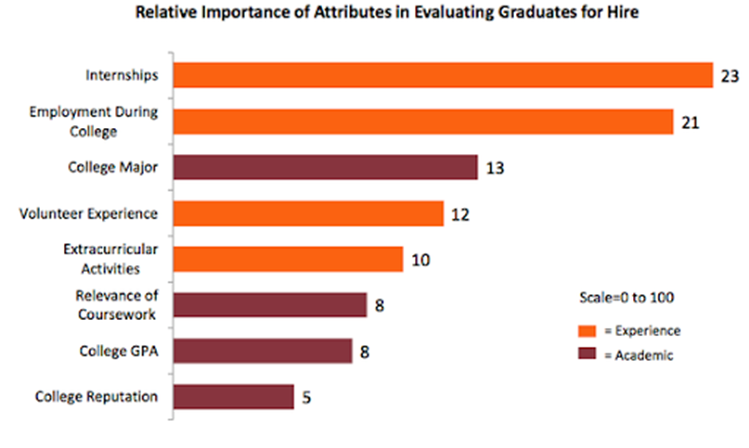Getting a good degree is the first step to getting a great job.
But what else will make you stand out from other graduates?
Experience is one of the things employers value most. According to ‘The Graduate Market 2020’ report from High Fliers Research, two fifths of employers surveyed warned that in today’s competitive job market, it was either ‘not very likely’ or ‘not at all likely’ that a graduate with no previous work experience would be successful during their selection process, irrespective of their academic achievements.
Gaining relevant professional experience whilst studying full time may appear impossible, but it can be done if you choose the right degree course from the start.
UK universities offer a range of opportunities to work with external companies or other organisations, usually as part of an extended master’s or undergraduate programme.
Professional placements help students gain real insight into the working practices of their chosen field.
They gain the practical skills employers are looking for, and start to build a network of future contacts within industry.
Students often perform better in exams and assignments when they return to their studies, as they are more knowledgeable and motivated following a placement.
This blog looks at the key features of master’s degrees with placement programmes; how they work and why they should be a key consideration for international students applying to the UK.

Source - “The Role of Higher Education in Career Development: Employer Perceptions", by The Chronicle of Higher Education and American Public Media’s Marketplace
How do placements work in practice?
Take the University of Portsmouth’s MSc Electronic and Electrical Engineering course as an example.
This course combines a professional experience module or a six month placement with taught modules designed to develop the skills and understanding needed in electronic and electrical engineering.
You would do this module or placement for six months between September and March, after completing your year of taught studies and MSc project. Don’t forget, a UK PGT (postgraduate taught) programme is usually 12 months so, in total, the duration in this example is only 18 months.
Another example is MSc Innovation Management and Entrepreneurship again from the University of Portsmouth.
On this course, you have the opportunity to apply for a 12 month placement, supported by a specialist placement adviser. Students who succeed in securing a placement, complete the MSc in 24 months and gain significant commercial experience as well as their Master’s award.
Some placements pay a salary (the current average for a 12-month paid placement is £16,500) and can be undertaken in the UK or internationally.
What will I actually do on placement?
The purpose of a placement is to provide relevant, practical experience in your subject. On an MSc Electronic and Electrical Engineering placement for example, you may find yourself working in fields such as test engineering, design engineering, manufacturing engineering, programming, fault-finding, and research and development. The projects you undertake depend on the type of placement you choose along with your interests and long-term career plans.
Will I get help finding a placement?
Universities with well-established placement programmes support students both before and during their placements.
Portsmouth students receive advice and practical support from a dedicated Careers and Employability Service and each faculty has its own specialist Placements Office.
There is also support for those who want to start up a business during a self-employed placement year. If you are interested in this, check to see which universities run student enterprise programmes and start up advice.
Some students prefer to find their own placement, using personal contacts or professional networking sites. Universities will check that the placement meets the requirements of the course before they approve it.
You can begin looking and applying for placements before completing your first teaching block.
What happens if I don’t secure a placement?
Students without a placement will still be supported to develop employability skills and be better prepared for the workplace. This could be through an entrepreneurship, industrial-related or consultancy project.
In conclusion
As well as giving you a competitive edge, placements can provide a fresh perspective on your subject and the wider world. A placement can help build both personal confidence and a professional network. Having experience of your chosen industry means you can make informed decisions about your future career path.
As a direct result of a successful placement, this Business Management student was offered a permanent role with the company as a Junior Marketing Consultant. Their manager commented: “...this was a great experience for us as an employer. By the end of the employment, (the student) was able to confidently communicate complex marketing strategies and work alongside us on high-profile projects and accounts.”
Another student commented, “I received very good support from my Placement Officer. My placement was at a local technology company specialising in global digital supply chain solutions. I gained in confidence during the placement and (the company) agreed to me coming back over the summer to do primary data collection with the Project Manager and IT team. I would encourage other students to do a placement. It is a good opportunity to learn, not just new skills, but about yourself.”
This student’s employer added, “Without [student’s] valuable and diligent effort, this programme of strategic improvements would not be anywhere near the advanced stage it is in now. Their excellent grasp of analytics and quick assessment was invaluable…”
Names have been removed to respect their privacy.
Found this helpful? Sign up and start planning your study-abroad journey today.